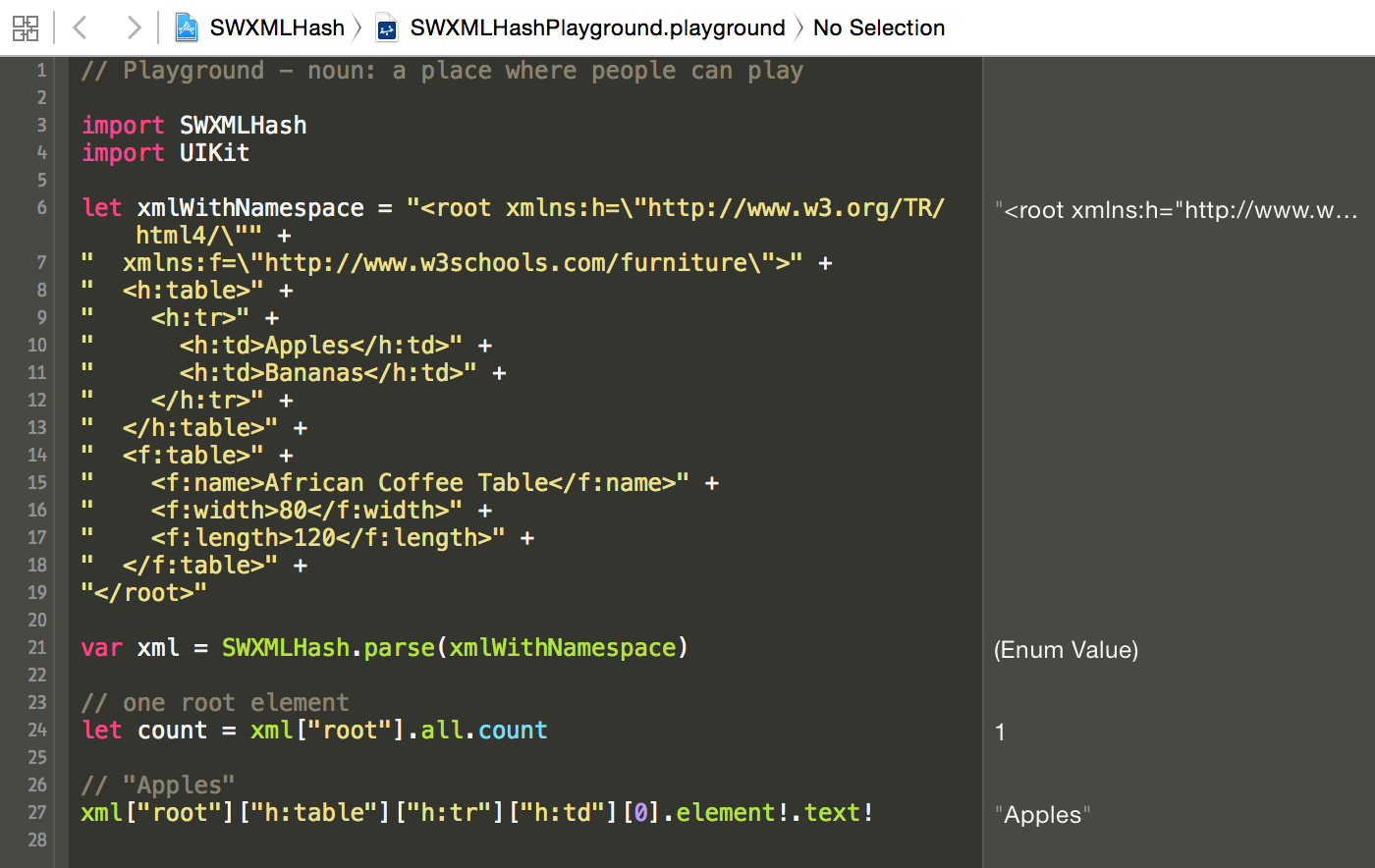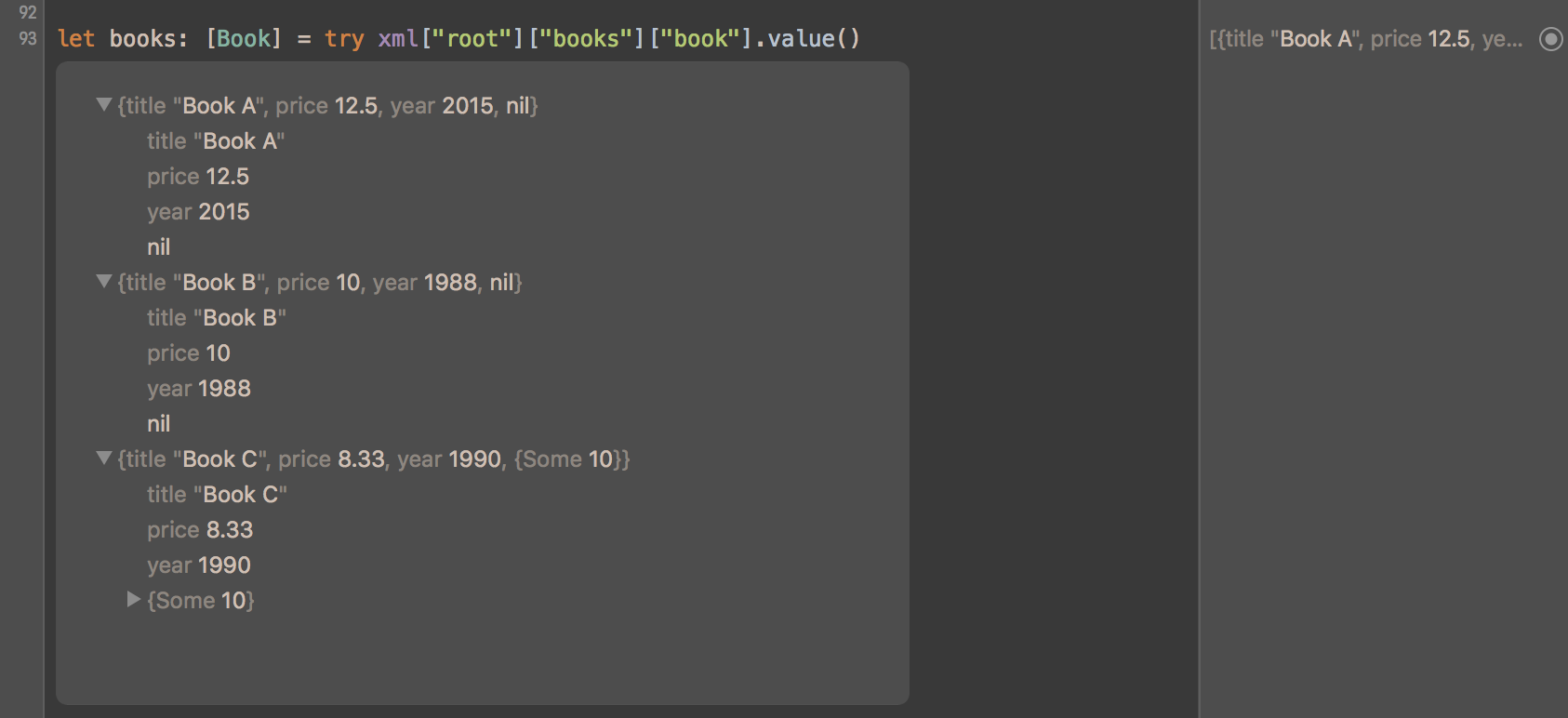SWXMLHash
SWXMLHash is a relatively simple way to parse XML in Swift. If you're familiar with NSXMLParser, this library is a simple wrapper around it. Conceptually, it provides a translation from XML to a dictionary of arrays (aka hash).
The API takes a lot of inspiration from SwiftyJSON.
Contents
Requirements
- iOS 8.0+ / Mac OS X 10.9+ / tvOS 9.0+ / watchOS 2.0+
- Xcode 8.0+
Installation
SWXMLHash can be installed using CocoaPods, Carthage, Swift Package Manager, or manually.
CocoaPods
To install CocoaPods, run:
$ gem install cocoapods
Then create a Podfile with the following contents:
platform :ios, '10.0'
use_frameworks!
target 'YOUR_TARGET_NAME' do
pod 'SWXMLHash', '~> 5.0.0'
end
Finally, run the following command to install it:
$ pod install
Carthage
To install Carthage, run (using Homebrew):
$ brew update
$ brew install carthage
Then add the following line to your Cartfile:
github "drmohundro/SWXMLHash" ~> 5.0
Swift Package Manager
Swift Package Manager requires Swift version 4.0 or higher. First, create a Package.swift file. It should look like:
dependencies: [
.package(url: "https://github.com/drmohundro/SWXMLHash.git", from: "5.0.0")
]
swift build should then pull in and compile SWXMLHash for you to begin using.
Manual Installation
To install manually, you'll need to clone the SWXMLHash repository. You can do this in a separate directory or you can make use of git submodules - in this case, git submodules are recommended so that your repository has details about which commit of SWXMLHash you're using. Once this is done, you can just drop the SWXMLHash.swift file into your project.
NOTE: if you're targeting iOS 7, you'll have to install manually because embedded frameworks require a minimum deployment target of iOS 8 or OSX Mavericks.
Getting Started
If you're just getting started with SWXMLHash, I'd recommend cloning the repository down and opening the workspace. I've included a Swift playground in the workspace which makes it easy to experiment with the API and the calls.
Configuration
SWXMLHash allows for limited configuration in terms of its approach to parsing. To set any of the configuration options, you use the configure method, like so:
let xml = SWXMLHash.config {
config in
// set any config options here
}.parse(xmlToParse)
The available options at this time are:
shouldProcessLazily- This determines whether not to use lazy loading of the XML. It can significantly increase the performance of parsing if your XML is large.
- Defaults to
false
shouldProcessNamespaces- This setting is forwarded on to the internal
NSXMLParserinstance. It will return any XML elements without their namespace parts (i.e. "<h:table>" will be returned as "<table>") - Defaults to
false
- This setting is forwarded on to the internal
caseInsensitive- This setting allows for key lookups to be case insensitive. Typically XML is a case sensitive language, but this option lets you bypass this if necessary.
- Defaults to
false
encoding- This setting allows for explicitly specifying the character encoding when an XML string is passed to
parse. - Defaults to
String.encoding.utf8
- This setting allows for explicitly specifying the character encoding when an XML string is passed to
userInfo- This setting mimics
Codable'suserInfoproperty to allow the user to add contextual information that will be used for deserialization. - See Codable's userInfo docs
- The default is [:]
- This setting mimics
detectParsingErrors- This setting attempts to detect XML parsing errors.
parsewill return anXMLIndexer.parsingErrorif any parsing issues are found. - Defaults to
false(because of backwards compatibility and because many users attempt to parse HTML with this library)
- This setting attempts to detect XML parsing errors.
Examples
All examples below can be found in the included specs.
Initialization
let xml = SWXMLHash.parse(xmlToParse)
Alternatively, if you're parsing a large XML file and need the best performance, you may wish to configure the parsing to be processed lazily. Lazy processing avoids loading the entire XML document into memory, so it could be preferable for performance reasons. See the error handling for one caveat regarding lazy loading.
let xml = SWXMLHash.config {
config in
config.shouldProcessLazily = true
}.parse(xmlToParse)
The above approach uses the new config method, but there is also a lazy method directly off of SWXMLHash.
let xml = SWXMLHash.lazy(xmlToParse)
Single Element Lookup
Given:
<root>
<header>
<title>Foo</title>
</header>
...
</root>
Will return "Foo".
xml["root"]["header"]["title"].element?.text
Multiple Elements Lookup
Given:
<root>
...
<catalog>
<book><author>Bob</author></book>
<book><author>John</author></book>
<book><author>Mark</author></book>
</catalog>
...
</root>
The below will return "John".
xml["root"]["catalog"]["book"][1]["author"].element?.text
Attributes Usage
Given:
<root>
...
<catalog>
<book id="1"><author>Bob</author></book>
<book id="123"><author>John</author></book>
<book id="456"><author>Mark</author></book>
</catalog>
...
</root>
The below will return "123".
xml["root"]["catalog"]["book"][1].element?.attribute(by: "id")?.text
Alternatively, you can look up an element with specific attributes. The below will return "John".
xml["root"]["catalog"]["book"].withAttribute("id", "123")["author"].element?.text
Returning All Elements At Current Level
Given:
<root>
...
<catalog>
<book><genre>Fiction</genre></book>
<book><genre>Non-fiction</genre></book>
<book><genre>Technical</genre></book>
</catalog>
...
</root>
The all method will iterate over all nodes at the indexed level. The code below will return "Fiction, Non-fiction, Technical".
", ".join(xml["root"]["catalog"]["book"].all.map { elem in
elem["genre"].element!.text!
})
You can also iterate over the all method:
for elem in xml["root"]["catalog"]["book"].all {
print(elem["genre"].element!.text!)
}
Returning All Child Elements At Current Level
Given:
<root>
<catalog>
<book>
<genre>Fiction</genre>
<title>Book</title>
<date>1/1/2015</date>
</book>
</catalog>
</root>
The below will print "root", "catalog", "book", "genre", "title", and "date" (note the children method).
func enumerate(indexer: XMLIndexer) {
for child in indexer.children {
print(child.element!.name)
enumerate(child)
}
}
enumerate(indexer: xml)
Filtering elements
Given:
<root>
<catalog>
<book id=\"bk101\">
<author>Gambardella, Matthew</author>
<title>XML Developer's Guide</title>
<genre>Computer</genre><price>44.95</price>
<publish_date>2000-10-01</publish_date>
</book>
<book id=\"bk102\">
<author>Ralls, Kim</author>
<title>Midnight Rain</title>
<genre>Fantasy</genre>
<price>5.95</price>
<publish_date>2000-12-16</publish_date>
</book>
<book id=\"bk103\">
<author>Corets, Eva</author>
<title>Maeve Ascendant</title>
<genre>Fantasy</genre>
<price>5.95</price>
<publish_date>2000-11-17</publish_date>
</book>
</catalog>
</root>
The following will return return "Midnight Rain". Filtering can be by any part of the XMLElement class or by index as well.
let subIndexer = xml!["root"]["catalog"]["book"]
.filterAll { elem, _ in elem.attribute(by: "id")!.text == "bk102" }
.filterChildren { _, index in index >= 1 && index <= 3 }
print(subIndexer.children[0].element?.text)
Error Handling
Using Swift 2.0's new error handling feature:
do {
try xml!.byKey("root").byKey("what").byKey("header").byKey("foo")
} catch let error as IndexingError {
// error is an IndexingError instance that you can deal with
}
Or using the existing indexing functionality:
switch xml["root"]["what"]["header"]["foo"] {
case .element(let elem):
// everything is good, code away!
case .xmlError(let error):
// error is an IndexingError instance that you can deal with
}
Note that error handling as shown above will not work with lazy loaded XML. The lazy parsing doesn't actually occur until the element or all method are called - as a result, there isn't any way to know prior to asking for an element if it exists or not.
Simple Type Conversion
Given:
<root>
<elem>Monday, 23 January 2016 12:01:12 111</elem>
</root>
With the following implementation for Date element and attribute deserialization:
extension Date: XMLElementDeserializable, XMLAttributeDeserializable {
public static func deserialize(_ element: XMLElement) throws -> Date {
let date = stringToDate(element.text)
guard let validDate = date else {
throw XMLDeserializationError.typeConversionFailed(type: "Date", element: element)
}
return validDate
}
public static func deserialize(_ attribute: XMLAttribute) throws -> Date {
let date = stringToDate(attribute.text)
guard let validDate = date else {
throw XMLDeserializationError.attributeDeserializationFailed(type: "Date", attribute: attribute)
}
return validDate
}
private static func stringToDate(_ dateAsString: String) -> Date? {
let dateFormatter = DateFormatter()
dateFormatter.dateFormat = "EEE, dd MMM yyyy HH:mm:ss zzz"
return dateFormatter.date(from: dateAsString)
}
}
The below will return a date value:
let dt: Date = try xml["root"]["elem"].value()
Complex Types Conversion
Given:
<root>
<books>
<book isbn="0000000001">
<title>Book A</title>
<price>12.5</price>
<year>2015</year>
<categories>
<category>C1</category>
<category>C2</category>
</categories>
</book>
<book isbn="0000000002">
<title>Book B</title>
<price>10</price>
<year>1988</year>
<categories>
<category>C2</category>
<category>C3</category>
</categories>
</book>
<book isbn="0000000003">
<title>Book C</title>
<price>8.33</price>
<year>1990</year>
<amount>10</amount>
<categories>
<category>C1</category>
<category>C3</category>
</categories>
</book>
</books>
</root>
with Book struct implementing XMLIndexerDeserializable:
struct Book: XMLIndexerDeserializable {
let title: String
let price: Double
let year: Int
let amount: Int?
let isbn: Int
let category: [String]
static func deserialize(_ node: XMLIndexer) throws -> Book {
return try Book(
title: node["title"].value(),
price: node["price"].value(),
year: node["year"].value(),
amount: node["amount"].value(),
isbn: node.value(ofAttribute: "isbn"),
category : node["categories"]["category"].value()
)
}
}
The below will return an array of Book structs:
let books: [Book] = try xml["root"]["books"]["book"].value()
You can convert any XML to your custom type by implementing XMLIndexerDeserializable for any non-leaf node (e.g. <book> in the example above).
For leaf nodes (e.g. <title> in the example above), built-in converters support Int, Double, Float, Bool, and String values (both non- and -optional variants). Custom converters can be added by implementing XMLElementDeserializable.
For attributes (e.g. isbn= in the example above), built-in converters support the same types as above, and additional converters can be added by implementing XMLAttributeDeserializable.
Types conversion supports error handling, optionals and arrays. For more examples, look into SWXMLHashTests.swift or play with types conversion directly in the Swift playground.
FAQ
Does SWXMLHash handle URLs for me?
No - SWXMLHash only handles parsing of XML. If you have a URL that has XML content on it, I'd recommend using a library like AlamoFire to download the content into a string and then parsing it.
Does SWXMLHash support writing XML content?
No, not at the moment - SWXMLHash only supports parsing XML (via indexing, deserialization, etc.).
I'm getting an "Ambiguous reference to member 'subscript'" when I call .value().
.value() is used for deserialization - you have to have something that implements XMLIndexerDeserializable (or XMLElementDeserializable if it is a single element versus a group of elements) and that can handle deserialization to the left-hand side of expression.
For example, given the following:
let dateValue: Date = try! xml["root"]["date"].value()
You'll get an error because there isn't any built-in deserializer for Date. See the above documentation on adding your own deserialization support. In this case, you would create your own XMLElementDeserializable implementation for Date. See above for an example of how to add your own Date deserialization support.
I'm getting an EXC_BAD_ACCESS (SIGSEGV) when I call parse()
Chances are very good that your XML content has what is called a "byte order mark" or BOM. SWXMLHash uses NSXMLParser for its parsing logic and there are issues with it and handling BOM characters. See issue #65 for more details. Others who have run into this problem have just stripped the BOM out of their content prior to parsing.
How do I handle deserialization with a class versus a struct (such as with NSDate)?
Using extensions on classes instead of structs can result in some odd catches that might give you a little trouble. For example, see this question on StackOverflow where someone was trying to write their own XMLElementDeserializable for NSDate which is a class and not a struct. The XMLElementDeserializable protocol expects a method that returns Self - this is the part that gets a little odd.
See below for the code snippet to get this to work and note in particular the private static func value<T>() -> T line - that is the key.
extension NSDate: XMLElementDeserializable {
public static func deserialize(_ element: XMLElement) throws -> Self {
guard let dateAsString = element.text else {
throw XMLDeserializationError.nodeHasNoValue
}
let dateFormatter = NSDateFormatter()
dateFormatter.dateFormat = "EEE, dd MMM yyyy HH:mm:ss zzz"
let date = dateFormatter.dateFromString(dateAsString)
guard let validDate = date else {
throw XMLDeserializationError.typeConversionFailed(type: "Date", element: element)
}
// NOTE THIS
return value(validDate)
}
// AND THIS
private static func value<T>(date: NSDate) -> T {
return date as! T
}
}
How do I handle deserialization with an enum?
Check out this great suggestion/example from @woolie up at https://github.com/drmohundro/SWXMLHash/discussions/245.
Have a different question?
Feel free to shoot me an email, post a question on StackOverflow, or open an issue if you think you've found a bug. I'm happy to try to help!
Another alternative is to post a question in the Discussions.
Changelog
See CHANGELOG for a list of all changes and their corresponding versions.
Contributing
See CONTRIBUTING for guidelines to contribute back to SWXMLHash.
License
SWXMLHash is released under the MIT license. See LICENSE for details.




